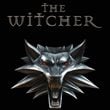How The Witcher franchise mixes fantasy with modern world?
The universe of The Witcher may seem like your regular, almost generic, fantasy world – give it a second thought, though, and you’ll find this world to be quite unique. But how was this achieved?
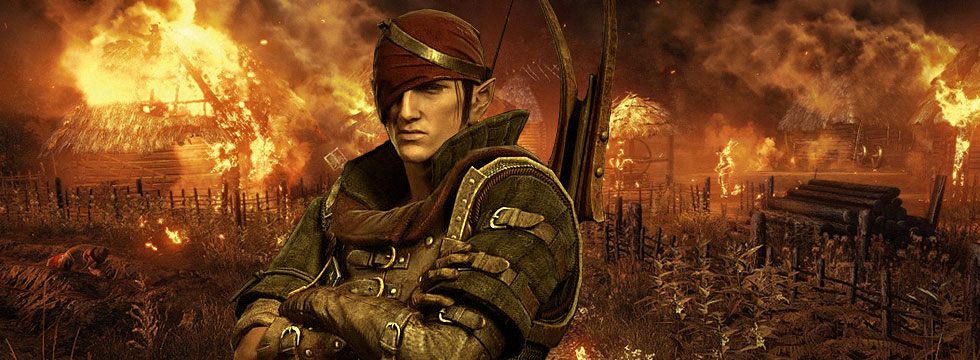
The world of The Witcher may seem to be very close to other popular fantasy universes, such as the Forgotten Realms from D&D, Warhammer’s Old World or Tolkien’s Middle Earth, but such impression is misleading. Ok – the world is very evocative of the Middle Ages and seasoned with a good portion of, broadly understood, magic and fantasy races: elves, dwarves and halflings. This world, however, in the books referred to as the Continent, is characterized by a certain – and very apparent – feature, which is nowhere to be found in other fantasy realms: the anachronism.
The virtual worlds of magic and sword usually maintain a degree of consistency in rendering the epoch, on which they are being based – which are usually the Middle Ages, either late or middle, or a slightly more recent era. Meanwhile, in case of the Continent, such setting is only consistent in relation to the general outline of matters such as the level of technology (especially of the military), architecture or the structure of the society. If you examine the world more thoroughly, you will see that there constantly appear elements that feel very modern. What are these elements? What prompted the author to include them? What’s their purpose? These are the questions we’ll try to address in this article.
As you can guess, getting hit by a stray spoiler in this article is quite possible. While we’re not going to analyze the content (and definitely not the endings) of neither of the books nor games in detail, we will recall some random events here and there, so beware.
Let’s begin the analysis at the very source of the anachronisms in The Witcher, that is – the books. We have to keep in mind that it’s none other but Andrzej Sapkowski who molded this world. The developers at CD Projekt RED have merely recreated and adapted the style imposed by the saga – recreated with mastery and impressive fidelity to the source material, I should add.
One of the first remarks Mr. Sapkowski has made about mixing modern and medieval realities can be found in the preface to A Road With No Return short story, which was included in the collection of stories entitled Cos sie konczy, cos sie zaczyna (Something Ends, Something Begins – it can only be found as an unofficial English translation on CD Projekt’s forums). The short story is among the author’s oldest output, and – focusing on Geralt’s parents – wasn’t initially planned as canonical. When it was first published, the editor objected to using the word “intelligence”, and opted for “wisdom”, arguing that it was more fitting for the setting. Sapkowski went on to explain that he totally disagrees with such an assessment, since for him, fantasy doesn’t equal Middle Ages.
![If Sapkowski referenced communism in Warriors of God (part of Hussite Trilogy), why wouldn’t CD Projekt Red do the same? [in-game book called Wondrous World of Insectoids] - 2018-03-05](https://cdn.gracza.pl/gallery/html/article/277299358.jpg)
Single words that don’t match the “historical context”, scattered on the pages of Sapkowski’s books are merely the tip of the anachronistic iceberg, though. There are two books that are an invaluable source of information about Sapkowski’s approach to fantasy, both written by the man himself: Rekopis znaleziony w smoczej jaskini. Kompendium wiedzy o literaturze fantasy (The Manuscript Found in Dragon’s Lair. A Fantasy Literature Compendium) and Historia i fantastyka (History and Fantasy – neither available in English) – the latter is a transcription of an extended interview with the author. In that book, you can find a quote by another Polish writer, Marek Oramus, which sums up Sapkowski’s way of constructing the setting pretty well:
“[Sapkowski] introduces 20th-century ideas and words into the medieval world – things such as “ecology”, “genetic code”, “weapon of mass destruction”, “demarcation line”, and so on. His characters have the consciousness of modern people, even if they use archaic language. These are other-worldly Middle Ages; it’s a mashup.”
Although this particular quote was concerning Sapkowski’s historic-fantastic Hussite Trilogy, it definitely offers a good explanation of the way the world of The Witcher is constructed. I assume that everyone who’s ever read any of the books about Geralt of Rivia will agree that the above statement is a very accurate breakdown of the Continent’s characteristics. Just take a look at the syntax and the vocabulary of any random character, and it will become clear as a day that these are not very medieval minds. Notions such as psychology or genes are used in all sorts of situations. That of course doesn’t mean Sapkowski forgot about a medieval dressing – it’s quite the opposite. There’s a healthy dose of archaisms within the dialogues, and there’s plenty of uneducated peasants and other kinds of daft individuals. The way people, and especially dwarves, swear in the books is also heavily stylized.
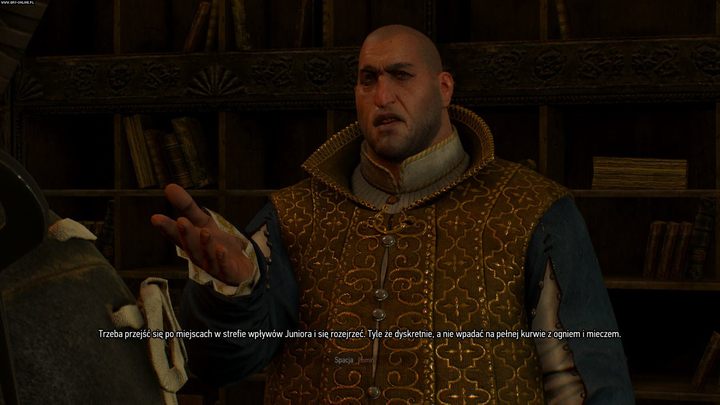
Science is a great river…
The illusion of a medieval world dispels quickly upon encountering two particular social groups of The Witcher universe. The first group are scholars and scientists – for example from the Oxenfurt Academy. If you read the books, you might recall that moment in Blood of Elves (the first tome of the saga) when Geralt was hired to protect a barge in the delta of the Pontar River. Aboard the barge, he amused himself by chatting with Linus Pitt, a professor of natural history, who was trying to educate the White Wolf. Here’s a quote:
“The Hyphydridae family, belonging to the Amphipoda order, includes four species known to science. Two live exclusively in tropical waters. In our climate, on the other hand, one can come across – though very rarely now – the not-so-large Hyphydra longicauda and the somewhat larger Hyphydra marginata. The biotope of both species is stagnant water or water which flows very slowly. The species are, indeed, predatory, preferring to feed on warm-blooded creatures.”
It’s pretty difficult to imagine a “real” professor of a medieval university using such terminology, isn’t it? Bear in mind, however, that this whole scene was rather humorous in general – it turned out that the ignorant and barbaric witcher had had better knowledge of marine fauna (monsters, to be exact) than the bachelor, who’s able to describe all sorts of different species, biotopes and ecological niches, but has learned about them behind the academy’s walls, in a sterile environment. There are numerous other instances, when Sapkowski’s laughing at the men of letters, while at the same time consequently building a reality, in which the absence of gunpowder seems almost a glaring oversight.
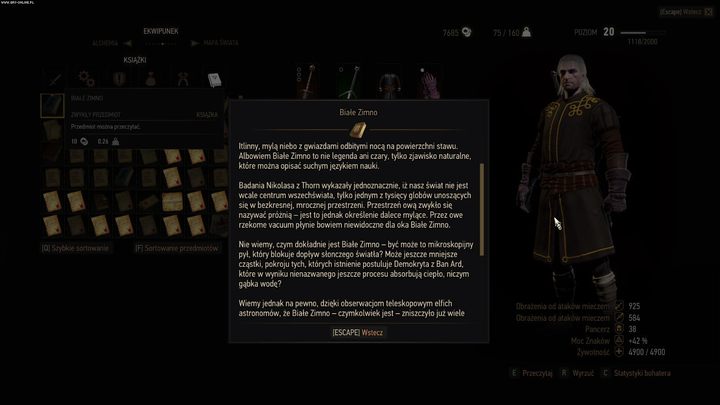
Because the developers from CDPR know their beans and have plenty of talent, they were able to replicate Sapkowski’s really well, and thus we can encounter numerous anachronisms in the video game series as well. Remember Kalkstein, the alchemist from the first game? After helping him get into the tower on the swamps, he develops a theory stating that the world is made of tiny particles (what we refer to as atoms). A similar idea can be found in one of the books in The Wild Hunt, the one titled White Frost (it also contains a neat reference to the heliocentric model). Too bad the developers didn’t make better use of the Oxenfurt Academy – the city is there, but the university is closed tight, a mere decoration (save for a single quest in Hearts of Stone, which is not nearly enough).
Magic in service of progress?
The other group I wanted to name, are the sorcerers – as they enter the scene, the remains of the illusory “medievalness” disperse in panic, and not in the least because of fireballs. The repertoire of their spells doesn’t deviate from the regular set of magic tricks available in other fantasy worlds – you have lightning bolts, teleportation, illusions, healing spells, enchanted weapons, turning people into frogs and what not. Also, the way the magic works may seem similar, as it’s based on the energy derived from the four elements: fire, air, water, and earth. Things get more interesting, though, when the magic is used for more specialized purposes.
Blood of Elves offers another interesting fragment that should help me illustrate my point. When Tissaia de Vries, a grandmaster of magic, was visiting the laboratories of Vilgefortz of Roggeveen (he’s the main antagonist in the saga), we could read:
“Tissaia de Vries was an Archmage – there was no screen she could not penetrate. And she was a little curious as to what the mage had been doing of late. She worked out the configuration of the recently used apparatus in a flash. It served for the detection of persons who had disappeared while enabling a psychic vision by means of the ‘crystal, metal, stone’ method. The wizard was either searching for someone or resolving a theoretical, logistical problem.”
Another great example can be found in The Lady of the Lake, when members of the Sorceresses Lodge were monitoring the attack of a “task force” taking place on the other end of the world. The attack was displayed on a “communication oval”, which “wavered, flickered, and disappeared from time to time”, before it was magically stabilized… pretty much like a CRT TV. Apart from that, Sapkowski’s magic has numerous, almost endless applications, such as telepathy, “probing” of minds or setting up magical alarms, just to name a few things. Genetic modifications are also within the sorcerers’ capabilities, as we could see in Season of Storms.
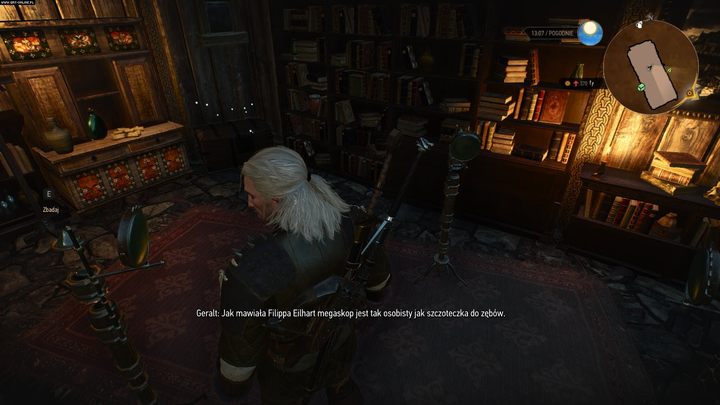
The effects of being able to do magic were also described very “ahistorically”. As Tissaia de Vries writes in her book, The Poisoned Source, a fragment of which is cited in Blood of Elves, a magical talent makes the sorcerers “Lose the ability to procreate due to somatic changes and dysfunction of the pituitary gland. Some wizards – usually women – attune to magic while still maintaining the efficiency of the gonads.” Not really a medieval level of knowledge of anatomy, isn’t it?
Fortunately, Sapkowski explained his approach to magic, although rather briefly – and contrary to many other aspects of his books. Answering one of the questions in History and Fantasy, he explained: “What I wanted to achieve was a novel approach to magic, one that would be analogous to my understanding of science.” This scientific approach to magic still feels fresh and novel – even despite all that’s happened in fantasy since the heyday of The Witcher.
CD Projekt RED’s mastery in rendering the writers’ – often obscure – ideas can be observed here as well. A good illustration of magic being a tool of conveying parallels between our world and the world of The Witcher is the easter egg from the Tower From Nowhere side quest in The Wild Hunt – you can find a book in a tower, in which you will read about two opposing spells: GOG and DRM (see the screen below). Still, the developers were generally more economical with using magic as a way to smuggle the achievements of modern science into the quasi-medieval world.
![Some would say that this is self-advertisement. Others will say: that’s a damn good easter egg. [in-game book called Gottfried’s Omno-opening Grimoire]. - 2018-03-05](https://cdn.gracza.pl/gallery/html/article/277299421.jpg)
Surgeons, patriots, literate peasants and other wonders
There are lots and lots of other examples of anachronisms in the universe, many of them beyond books and magic. The medical knowledge of the inhabitants of the Continent, for example, is pretty impressive if you think about it. The physicians in The Witcher are most definitely not a bunch of quacks, who think bloodletting is the remedy for every disease. In the last book of the saga, Lady of the Lake, during the Battle of Brenna, Shani was assisting a halfling surgeon, Rusty, in patching up wounded soldiers. After one surgery, Rusty congratulated his team “a successful resection of the small intestine, colon, splenectomy and liver stitching.” The games generally follow suit with this trend: in The Witcher, Geralt performed an autopsy with Shani; the medics of the Vilmerius Hospital in Novigrad diagnose the White Wolf with anemia – or rather would have, as they say themselves, if Gerlat was a normal human.
The sense of national pride cherished by the people of the Continent, who use notions such as “homeland” may also raise eyebrows. It’s particularly conspicuous among the Northerners in the face of the Nilfgaard invasion – both in the books (Lady of the Lake), and in games (be it The Witcher 2 or The Wild Hunt). There’s no shortage of volunteers joining the army to fulfill their motherland’s call of duty (such as Jarre – a young scribe, who looses his arm in the Battle of Brenna); the video game adaptations are also full of manifests distributed on the sly that are calling the compatriots, while appealing to their sense of patriotism, to join the ranks and fight the Black Ones. This would be unacceptable in a historically accurate world, as the concept of a “country” didn’t come about until the 18th century. Let’s also not forget the terrorism of the Scoia'tael from the first and second installments. Geralt himself says in the original game that “You don't negotiate with terrorists. Negotiation leads to concessions, concessions are a victory for terror.” The notion of terrorism as we know it dates back to the 19th century.
“People often perceived the absence of God in my world as a mistake. Everyone tried to convince me that it’s an anachronism – after all, I’m writing about the Middle Ages. But let’s face it – The Witcher isn’t set it the Middle Ages!” – says Sapkowski in History and Fantasy. CD Projekt RED mended that “mistake” by giving religion a greater importance in the virtual world, but certainly without glorifying it.
Then there’s the matter of the judicial system in The Witcher. Geralt’s trial in Season of Storms, for example, probably isn’t the most faithful rendition of a 14th-century court case – during the trial, the witcher defends himself – using very good Latin – from accusations of “embezzlement of funds, and appropriating goods belonging to the crown.” A similar case is The Taxman Cometh side quest in the Hearts of Stone expansion, where Geralt is hailed by a tax office representative, who accuses the witcher of avoiding taxes, but this obviously was just a joke.
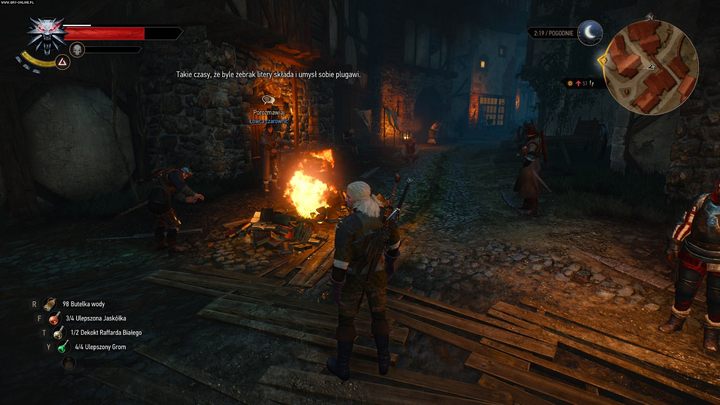
The last thing I shall mention in this section is one historical inconsistency that was only introduced in The Wild Hunt – the literacy of the peasants. While in Sapkowski’s books most of them were illiterate, according to good, medieval traditions, it’s hard to find a character in The Witcher 3 that can’t read and write. For reasons that are all too obvious: this was simply a requirement of the open world. Having a limited amount of time at their disposal and limited resources, the devs from Warsaw simply couldn’t create a convincing world without resorting to all sorts of scattered notes, books and notices. Besides, letters, notes and journals have become one of the most popular means of conveying the lore and the history of places and individuals – especially in sandboxes. This instance of anachronism, however, has to be considered a necessary evil, generated by the technical shortcomings. Still, when I’m playing the game I can’t help but frown at all the people who decided to write down their last thoughts before their demise came, not forgetting to include the exact location of their treasures.
The writer doesn’t bow to critics
As I have already stated, CD Projekt RED was merely trying to recreate a world that had been conceived by Andrzej Sapkowski – which is where we should look for answers about all these anachronisms, their origins and their purpose. In order to gain a better understanding of this phenomenon, we ought to take a closer look at the creator of Geralt. For a man, who “only” has a degree in economics, and who spent much of his youth dealing in international trade, Sapkowski is outstandingly sharp, eloquent and literate (especially when it comes to fantasy and historical books). On the other hand, modesty isn’t his thing (to put it mildly); sometimes he’s downright arrogant and simply full of himself. He can come across as cynical, inscrutable and contradictory. I should know, I’ve seen it on fantasy conventions and bookstore Q&A’s with the writer.
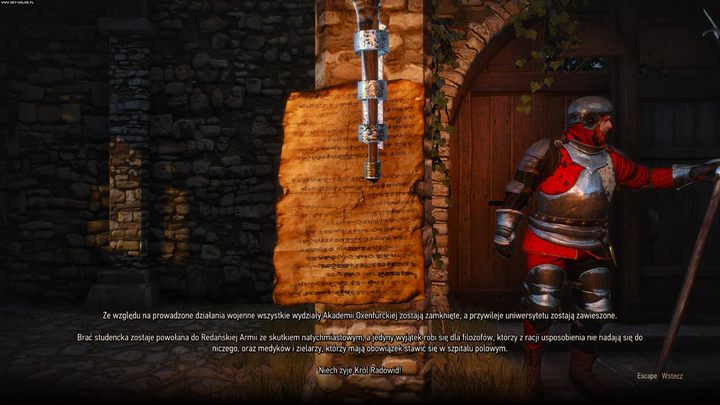
Considering the above, the assumption that every element of Sapkowski’s writing is surely a vessel for some deeper meaning seems only natural – especially since the man himself doesn’t deny the presence of numerous allusions and allegories in his books (which is hardly surprising, with this kind of knowledge). However, any critic of literature may encounter a much tougher nut to crack here; in the end, it often turns out that the creator of The Witcher wasn’t striving very hard to include any particular statement about his own reality in the books, nor was he indeed trying to smuggle some universal message between the lines. It’s just a theory, though, and the author himself is known to keep these things to himself. A small hint can be found in History and Fantasy, where Sapkowski, relentlessly pestered by the interviewer with questions about societal and political allusions in the stories about Geralt, smugly answers:
“If there’s a single, universal commonality between all worlds – be that our world or any fantastic world – it’s the amount of SOBs in high places. That’s my small, unassuming and personal message to the reader.”
Hence there’s probably no point searching for a genuine moral to the anachronisms in the world of the witcher. Refuting the interviewer’s opinion stating that “his characters have the mind of a 20th-century man,” Sapkowski points out – after accusing his interlocutor of poor knowledge of the canon of fantasy and the inability to understand the genre – that, as an author, he has the right to “stylize the language he operates with and create any kind of amalgam he heartily wishes, as long as this aids the story well.” Then he adds: “I’m not writing a historical dissertation. I can do many things, which I find amusing story-wise. Others cannot; I can. That’s my artistic freedom.” The freedom, as the author himself admits, has to be kept in check since “otherwise, the whole thing could become offhand fantasy – a complete nonsense.”
We have thus uncovered the underpinning, the centerpiece, of The Witcher saga: the story – simple as that. Sapkowski’s not a moralizer or a philosopher whose whole endeavor is to write down truths about the world. He’s more of a performer and a craftsman, his main goal being the creation of a great novel – a read that’s satisfying both to himself and his readers. The author’s ready to make great sacrifices for the sake of the story… including the universe he’s created.
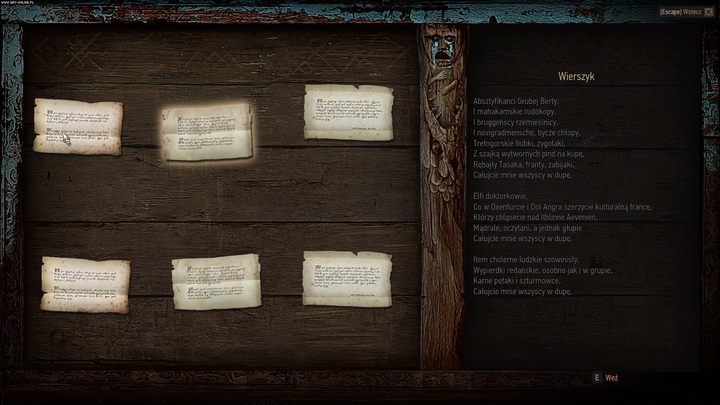
“I am frantically trying to convince the public that I have not created a universe! If you think about the ontology of the whole civilization, it’s barely there – its sole purpose is to serve the plot, to which it is entirely subjected. Of course later on, when I sat down to write a longer series, I had to create rudimentary geography, economy and the politics; I had to be more mindful of where’s the north, where’s the south and which way to the sea. But that was done insofar as the story demanded it – only if it was absolutely necessary. Nothing more. My world is a quasi-world; it’s merely a background, a batch of canvas moved with a backstage spinning wheel. And there’s a justification to that. This is not a story about a world – it’s a story about characters. The world is there for the sake of the story – not the other way around.”
In History and Fantasy Sapkowski also commented on the question of easter eggs – or rather, in literary terms, the humorous use of intertextuality:
“Of course I’m far from the degree of optimism that would warrant the belief that all readers will be able to uncover every single reference I’ve carefully hidden in the text. I’m more inclined to believe that it’s just my small inside joke addressed to a small group of people (…) I’m doing that for people who understand the subtlety; who know that I’m not plagiarizing – just giving them a wink.”
By now, it should become obvious that attributing too much importance to the anachronisms of The Witcher goes beside the point. Still, Sapkowski’s approach cannot be defined as simply “Other’s cannot; I can.” The line is pretty thin: arguably any author wants to avoid a situation, where their ideas become “complete nonsense.” On one hand, the author is totally fine with seasoning his fantasy with modern vocabulary; on the other, when talking about the Hussite Trilogy, the other great series by Sapkowski, (which is, let’s keep this in mind, historic-fantasy) he remembers, not without remorse:
“In Narrenturm, I have made my character “blush like a turkey”, whereas turkey is a bird native to the Americas and it didn’t appear in Europe in the pre-Columbian era. These are, of course, trifles, but I still consider them an abuse of the art of storytelling, and I strongly discourage anyone from such cynicism.”
So where actually is the border separating the fantastic never-never land and a real world upgraded with some magic? Why is it that in the former – even though it’s basically a medieval land – almost anything goes, and in the latter even a bird becomes a reprehensible mistake? Once again, Mr. Sapkowski offers a great explanation:
“Fantasy is grounded in medieval reality, but who says it is the medieval reality? It’s not our world – it’s a world of fantasy. Hence any reference to the Middle Ages is a tool, but not a requirement (…) I have said this many times on different occasions and I’ll say it again: if we wanted to stylize a fantasy world for medieval times, we wouldn’t be able to use the word “king”, which in Polish is a borrowing from Czech, derived from Charlemagne, the King of the Franks. Hence, in a world without Charlemagne, there can be no “kings.” If, however, you do decide to use the Polish word for a king in your book, why can’t you use words such as “erotic” or “psychic”, even though in your fantasy world there undoubtedly was no Greek Mythology, and thus no Eros and no Psyche?”
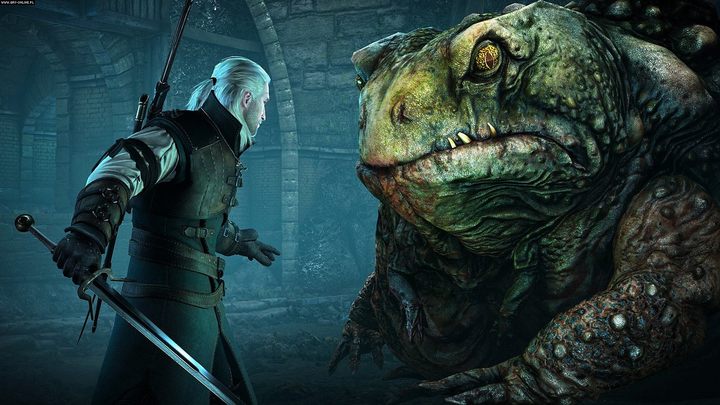
Poland’s main export good
Faced with these arguments, we’re left with little to do, but once again give proper kudos to CD Projekt RED, who chose to work with this difficult material. It sure wasn’t easy to cohesively forge this world into the reality of a video game – it was a world meant merely as a background to a story that reached a definitive conclusion after the seven books (I’m not counting Season of Storms here). Fortunately, the devs didn’t approach this world with disdain and disregard – quite the contrary. As I’ve already stressed a few times, the Warsaw-based studio showed great talent and aptitude in recreating the content of the novels in digital form. And even though I personally believe that rendering this world in The Wild Hunt as a sandbox wasn’t the perfect solution for the game, I cannot possibly say anything else to the guys and gals at CDPR, but chapeau bas!
I sincerely hope that my lengthy dissertation allowed you to realize that the universe of The Witcher – although having much in common with the Middle Earth and the Forgotten Realms – is actually substantially different from most fantasy realms. Love it or hate it, Sapkowski and his oeuvre cannot be denied one thing – they’re certainly one of a kind. I can’t possibly express how happy I was to see that the Continent, after it was exhausted by the writer, was inherited by a group of enthusiasts, who were not only able to accommodate the Sapkowski’s creation with due respect, but also were able to breathe a new life into it, bringing the franchise an international acclaim of fans and critics alike – all that without bereaving it of its peculiar qualities. Although the story of Geralt of Rivia has probably reached its ultimate conclusion in The Wild Hunt, the world itself may still become the arena of endless new tales. I just wish it was CD Projekt RED who would deliver these tales during the coming years… in reasonable intervals, too.


